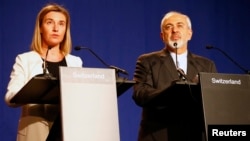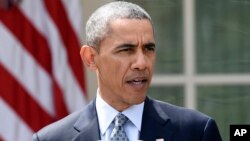Iran and six world powers agreed to "key parameters" for a preliminary deal involving Tehran's nuclear program Thursday, following eight days of talks in Lausanne, Switzerland.
European Union foreign policy chief Federica Mogherini and Iran's Foreign Minister Mohammad Javad Zarif announced the measure, saying enough progress had been reached to continue the negotiations until a final deadline of June 30.
"Today we have taken a decisive step," Mogherini said. "We have reached solutions on key parameters for a comprehensive future nuclear deal."
The tentative agreement clears the way for talks on a future comprehensive settlement that should allay Western fears that Iran was seeking to build an atomic bomb and in return lift economic sanctions on the Islamic Republic.
President Barack Obama, speaking from the White House Rose Garden Thursday, said the U.S. has reached a "historic understanding with Iran." He called the agreement "a good deal, a deal that meets our core objective" of keeping Iran from obtaining a nuclear weapon.
Obama outlined the basics of the agreement, whose key details will be finalized over the next three months.
He said that the deal reached between Iran and the six world powers would keep Iran from being able to pursue a bomb either using plutonium or enriched uranium, and that it was the best possible defense to Tehran covertly obtaining a nuclear weapon.
Obama, who has invested significant political capital in the nuclear negotiations, said his administration would fully brief Congress on the efforts. The talks have strained the U.S. relationship with Israel, which sees Tehran as an existential threat, and deepened tensions with Congress.
Kerry touts 'solid foundation'
U.S. Secretary John Kerry, speaking from Lausanne, said the Iran deal's parameters ensure that all pathways to a nuclear weapon have been blocked.
"The political understanding with details that we have reached is a solid foundation for the good deal we are seeking," he told reporters, according to Reuters news agency. "We still have many technical details, other issues that need to be worked out."
According to a State Department news release, the framework deal — fiercely opposed by U.S. ally Israel – substantially reduces Iran's enrichment program for at least a decade. Among its more than 40 parameters, it cuts the Islamic Republic's number of installed centrifuges for enrichment from 19,000 to 6,000, reduces its stockpile of low-enriched uranium, and extends its "breakout time" – the period needed to acquire sufficient material for a weapon – to at least a year. It's estimated to be two or three months now.
Iran also has agreed to transparency for its nuclear program, allowing inspectors to monitor the supply chain, materials and facilities.
Different restrictions on Iran's nuclear program would continue for a quarter-century. In return for compliance, international sanctions will be gradually lifted.
"Iran will receive sanctions relief, if it verifiably abides by its commitments," the release says.
The EU's Mogherini indicated that he was looking at fleshing out the framework deal. "We can now start drafting the text and annexes," said Mogherini, who has acted as a coordinator for the six powers: Britain, China, France, Germany, Russia and the United States.
Details meted out
Negotiations continued on a dispute over how much of the agreement to make public.
Its details are highly sensitive to both sides, especially Iran, which is worried about signing off on explicit targets to curb its nuclear program in the absence of a final settlement that would see economic sanctions lifted.
Zarif told reporters that once the International Atomic Energy Agency verifies that Iran has implemented all the key nuclear-related steps in the agreement, U.S. and EU nuclear-related sanctions would be suspended, calling that action "a major step forward."
The talks have centered on two positions: the U.S. and its five partners want to curb Iran's nuclear technologies so it cannot develop weapons; Tehran denies such ambitions but is negotiating because it wants economic sanctions imposed over its nuclear program to be lifted.
Israeli Prime Minister Benjamin Netanyahu demanded that the deal between Iran and world powers "significantly" curb Iran's nuclear program.
Moments before Iran and international negotiators announced the deal, Netanyahu put out this statement on his Twitter feed: "Any deal must significantly roll back Iran's nuclear capabilities and stop its terrorism and aggression."
A White House press official confirmed that President Obama discussed the deal with Israeli prime minister by phone while aboard Air Force One Thursday.
"The president emphasized that, while nothing is agreed until everything is, the framework represents significant progress towards a lasting, comprehensive solution that cuts off all of Iran’s pathways to a bomb and verifiably ensures the peaceful nature of Iran’s nuclear program going."
Obama also told Netanyahu that "he has directed his national security team to increase consultations with the new Israeli government about how we can further strengthen our long-term security cooperation with Israel and remain vigilant in countering Iran’s threats."
According to reports by Reuters, on Thursday U.N. Secretary-General Ban Ki-moon congratulated all parties to deal, saying a comprehensive nuclear deal between Iran and world powers by June 30 could "enable all countries to cooperate urgently to deal with the many serious security challenges they face."
Jordan's U.N. ambassador Dina Kawar, who is president of the United Nations Security Council for April, told reporters that she hoped the progress between Iran and world powers could "open up other situations in our region."
When asked for more detail, she said: "Maybe it will give us a chance also to address the issues of Palestine and Israel in the council ... Let's see what happens."
France said last week it plans to start discussions with partners in the "coming weeks" on a United Nations Security Council resolution to lay out parameters for ending the Middle East conflict.
Russia, a major Iranian ally, said there is no doubt the framework will have a "positive impact" on the Middle East. The foreign ministry said Iran would be allowed to take a more active role in solving regional conflicts.
Iran has always denied wanting to build a nuclear bomb, saying its nuclear program is strictly for peaceful civilian purposes.
US Congressional response
Republican House Speaker John Boehner (R-OH) issued a statement on Thursday saying "parameters for a final deal represent an alarming departure from the White House’s initial goals."
"Congress must be allowed to fully review the details of any agreement before any sanctions are lifted," he said, adding "my concerns about Iran’s efforts to foment unrest, brutal violence and terror have only grown. It would be naïve to suggest the Iranian regime will not continue to use its nuclear program, and any economic relief, to further destabilize the region."
“The Administration owes Congress the details on many key questions from today’s announcement," said a statement released by Rep. Ed Royce (R-CA), Chairman of the House Foreign Affairs Committee.
"Just what is the research and development that Iran will be permitted on its advanced centrifuges, key to advancing its nuclear program? What violations would constitute 'significant nonperformance?' There must be a zero-tolerance policy for Iranian cheating," he said.
U.S. Senator Bob Corker (R-Tenn.), chairman of the Senate Foreign Relations Committee, echoed demands for full congressional reviews of the details of preliminary deal.
Representative Eliot L. Engel (D-NY), the top Democrat on the House Committee on Foreign Affairs, said "no deal is better than a bad deal, and we need to ensure that this agreement forecloses any pathway to a bomb."
“As we move ahead with negotiations with Iran, our allies must know that we stand shoulder-to-shoulder with them to ensure their security and protection from Iran’s destabilizing activities,” he said.
Some material for this report came from Reuters and AP.






